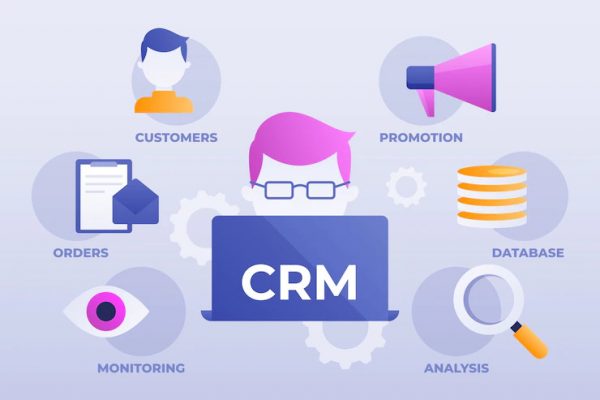Real estate is a business and it requires the same level of effort, attention to detail and professionalism as any other industry.
When it comes to tracking leads, assigning tasks to agents and managing relationships with clients, real estate CRM software can help you do all of these things faster and more effectively.
This article will guide you to know the keys to choosing the best real estate CRM software.
What Are the Basic Functions of Property Management Software?
Property management software is designed to help property managers and landlords manage their properties more efficiently. Some of the basic functions of property management software include:
- Tenant Management: it allows landlords and property managers to manage tenant information, including contact details, lease agreements, and payment history.
- Rent Collection: to collect rent payments electronically and track payment history.
- Maintenance and Repair Tracking: to create and track maintenance and repair requests, and schedule and assign tasks to vendors or staff.
- Financial Management: to track income and expenses, generate reports, and manage budgets.
- Communication: to communicate with tenants through email, text, or phone, with the ability to save, document and track communication history.
- Document Management: it allows property managers to store and manage important documents such as lease agreements, contracts, and insurance policies electronically.
- Marketing and Leasing: it allows landlords to market and list their properties, and track the progress of potential tenants through the leasing process.
- Mobile Access: Some property management software comes with a mobile app that allows users to access the software from their smartphones or tablets.
- Automation: with automation features such as automated payment reminders and overdue rent notices, which can help improve efficiency and reduce workload.
Benefits of CRM Software for Real Estate Companies
A CRM software is a tool that helps to manage leads, customer relationships and sales pipeline. It also tracks and analyzes data to improve productivity.
- You can easily manage your leads. With a real estate CRM software, you can create multiple lists of people who are interested in buying or renting property from you. You can get information about these prospects through email marketing campaigns or social media interactions (e.g., Facebook). This will allow you to send more relevant messages based on certain criteria. So that they don’t get lost in the inbox clutter!
- Improve customer satisfaction by tracking each step of the buying process with ease – from initial contact until closing day!
Things to Look for in a CRM for Real Estate Agents
- Easy to use: The CRM software you choose should be easy to learn and use. It should also provide an easy way for agents to access important information about the properties they’re looking at and their clients’ needs. So that they can make better decisions when negotiating contracts or showing properties.
- Easy to learn: If your real estate agent is new at working in a real estate CRM, this means there are some things he or she might not know about how it works yet. A good program will have resources available online or through support channels (e-mail) that explain how everything works together. So that your agent has no problem figuring out the ins-and-outs themselves!
- Affordable: You want something affordable so there’s no reason why not everyone could afford one! And while we’re talking about affordability—you don’t want anything too expensive either because then it’ll cost more money than just buying another smartphone instead which many people do anyways. So, why spend more money on something else?”
Key Considerations to Choose The Best CRM for Real Estate
Make sure the CRM has all the features you need to effectively manage your real estate business, such as contact management, appointment scheduling, task tracking, and automated communications.
Besides, it can integrate with other tools you use, such as your email marketing platform, social media accounts, and MLS. And, it can be accessed from multiple devices, including smartphones and tablets, so you can manage your business on the go.
Here are some key takeaways to choose the best real estate CRM.
1. Listings Organizer
The listings organizer is the center of your CRM. It’s where you create, manage and view all of your listings.
The dashboard will show you all of your active listings in one simple place. You can filter by location and price range, view pictures or video footage from each listing. You can tag properties with keywords that are relevant to buyers (or sellers), search for specific types of properties (e.g., “single family homes with two bathrooms”), see how much time people have left before viewing them online and more!
You can also customize this dashboard with additional fields like:
- Listing Details – This is where all basic information about a property (like number bedrooms) gets stored. So, when someone checks out their listing online they’ll see exactly what they need at first glance without having everything spelled out somewhere else first – saving time while still giving visitors access to important details quickly!
- Custom Fields – These allow you to specifically configure some filters within certain dimensions rather than having one set standard across every dimension available. Making it easier for users who aren’t familiar with data visualization tools but still want some control over what’s visible here too
2. Activity Tracking Features
Activity tracking features are a great way to keep track of all your activity in one place. These include:
- Tracking all communication with your leads, prospects and clients
- Tracking all marketing efforts (both online and offline)
- Tracking sales activities, such as lead generation, appointments and calls made on behalf of clients
- Tracking tasks like lead creation or email sequences sent out over the course of a month
3. Communication Tools
The communication tools that you have access to are key to making sure that you’re able to communicate with your team, clients and vendors.
If a message is not received by one party but another, it can cause delays in getting information from the other party or employee.
With real estate CRM software on your side, everything should be easy-peasy! You’ll be able to keep track of all incoming and outgoing messages for each person. So, there’s no confusion about what has been said or who said it (or both).
4. Leads Widget
A lead widget is a small, customizable piece of software that sits on your website and displays information about leads as they come in. It’s important to think about what kind of information you want to display in your lead widget.
So, it doesn’t look like spam or clutter up the page. Make sure that the design is simple and easy to read at first glance, but also allows for customization down the line if needed (i.e., by adding more fields).
Leads widgets can be used in many different ways:
- To help users navigate through their CRM account faster by providing quick access buttons such as “View All Leads” or “View Recent Activity”
- As an ad hoc tool for direct mail campaigns where multiple people need to know about an event or product launch before purchasing it.
5. Lead Scoring and Nurturing Tools
Lead scoring and nurturing tools are critical to your success as a real estate agent. If you don’t have the right system in place, it can be difficult to grow your business and meet demand for appointments.
Lead scoring is a method of assigning points to different attributes about each lead, allowing you to prioritize them based on what matters most to your business.
It’s important that the software allows users with different roles within the organization (such as salespeople) access to different sets of leads.
So, they don’t feel like they’re doing their job simply because they’re assigned one type of lead management activity rather than another type (like follow-up).
Lead nurturing tools are especially helpful if you want clients who aren’t ready right away but still need more information before making an appointment—or even buying something!
This can include automated emails providing updates on property listings or neighborhood trends; text messaging when new listings come on market; social media marketing campaigns targeting specific audiences within target areas where interest might be higher than average; etc.
6. Templates and Integrations
CRM software templates are pre-built forms that can be used to create new contacts or notes.
Templates also come in handy when you need to send out an email blast or make a phone call, because they already have the fields filled out with data that’s already been entered into your system.
Integrations are the ability to connect with third-party applications and APIs (application programming interfaces).
7. Integration With Email Marketing Platforms
Email marketing is a powerful tool for real estate agents and brokers to get leads, create relationships and drive sales.
A CRM that integrates with email marketing platforms gives you greater control over your database, which makes it easy for you to send emails based on the information in your CRM.
Some of the most popular email marketing platforms include MailChimp, Constant Contact and AWeber. If you use one of these services, be sure your CRM software supports their integration.
So that it can automatically pull in contact data from each customer’s inboxes once they sign up for an account on your site (or wherever else they’re signing up).
Why is Doorloop the Best Real Estate CRM?
Doorloop is a cloud-based real estate CRM that helps agents manage their business and grow their business. It offers a wide range of features to help real estate agents increase their productivity and revenue.
Doorloop’s free trial is available for new users who want to see what it can do for them before committing to purchasing an annual subscription plan or purchasing a time-limited version of the software.
Conclusion
CRM allows agents and brokers to organize and manage their interactions with clients, leads, and properties.
Features such as contact management, appointment scheduling, task tracking, and automated communications can help agents stay organized and on top of their workflow.
While also providing valuable insights into their business. Additionally, a CRM can help a real estate business build and maintain strong relationships with clients, which is essential for generating repeat business and referrals.
If you want to meet all of your real estate needs in a CRM then Doorloop can be an ideal choice for you. Sign up now and enjoy FREE trial.
Now, we hope you know the keys to choosing the best real estate CRM software. Comments below if you have anything to share.





I’m thoroughly captivated by the keen analysis and excellent way of expressing complex ideas. Your expertise shines through in every piece you write. It’s evident that you spend considerable time into researching your topics, and that effort does not go unnoticed. Thank you for sharing such detailed information. Keep up the great work! https://www.elevenviral.com